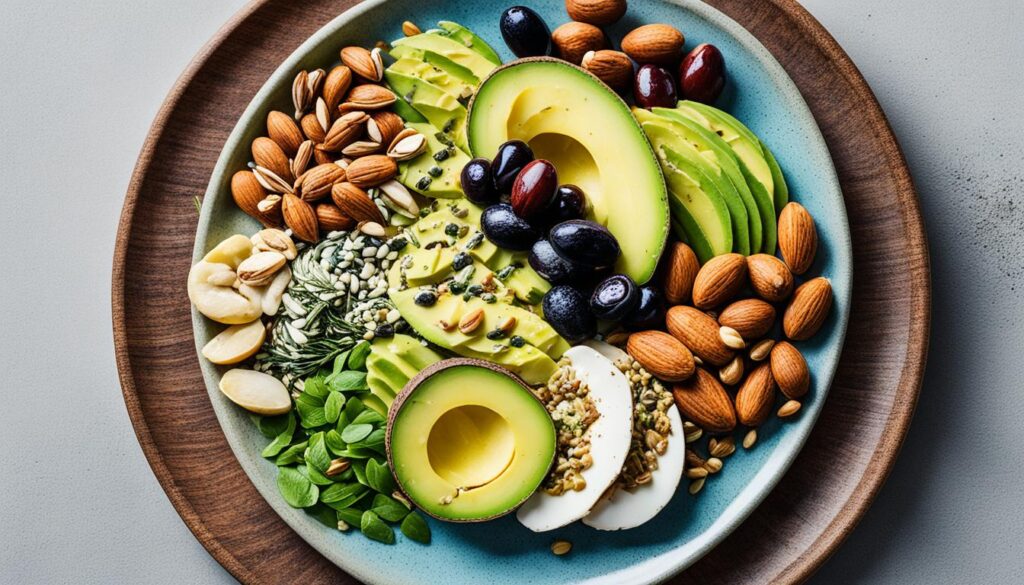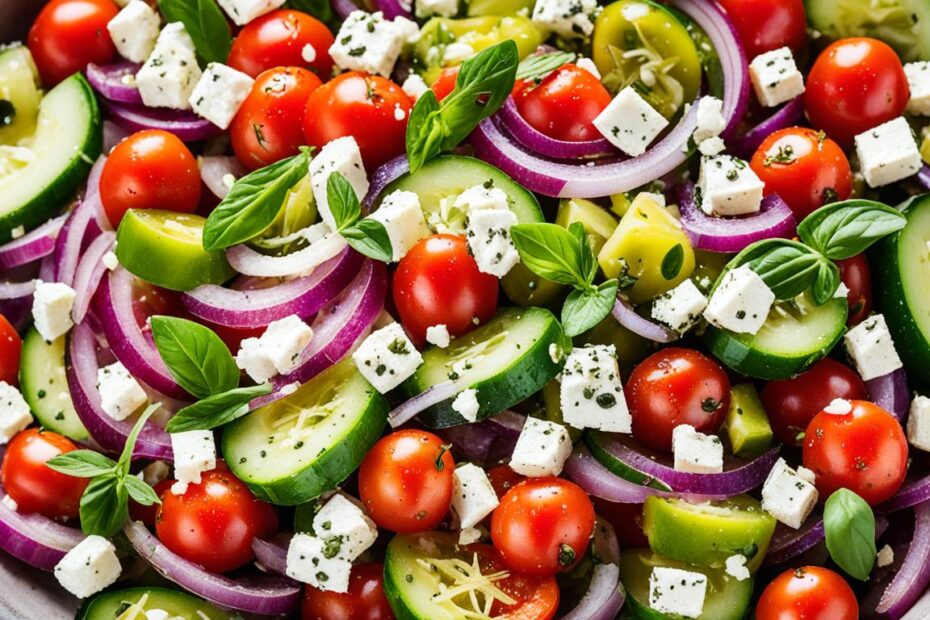Have you ever thought about why the Mediterranean diet is so good for health? I love talking about food and health, so I can’t wait to share what’s in this famous diet. The Mediterranean diet is not just any diet. It’s a tasty and versatile way of eating. It puts a lot of focus on plant foods, good fats, and the tastes of the Mediterranean region. Let’s find out more about it and why it’s such a great choice for staying healthy.
Introduction to the Mediterranean Diet
The Mediterranean diet isn’t just one way to eat. It’s the name for how people in countries by the Mediterranean Sea eat. They enjoy lots of plant foods and healthy fats. They also eat some animal products but not too much.
The Mediterranean Diet Origins and Principles
In the 1960s, scientists found something interesting. They saw people in places like Greece and Italy had less heart disease. This was compared to people in the U.S. and northern Europe. They looked more into what these Mediterranean folks were eating and doing. They found a pattern. It showed these people ate a lot of whole foods. They also valued eating together with friends and family.
Here are the key ideas of the Mediterranean diet:
- Prioritizing plant-based foods, such as fruits, vegetables, whole grains, and legumes
- Using olive oil as the primary source of fat
- Moderate consumption of dairy products, poultry, and fish
- Limiting red meat and processed foods
- Incorporating daily physical activity into the lifestyle
- Enjoying meals with family and friends in a social setting
The Mediterranean diet changes a bit depending on where you are. But, its main ideas are the same. It’s about eating fresh, simple foods and connecting with others through meals.
Key Components of the Mediterranean Diet
The mediterranean diet is all about plants. It focuses on veggies, fruits, whole grains, legumes, nuts, and seeds. These foods are rich in vitamins, minerals, and fiber. They also have great plant compounds for your health. You’ll find out why this diet is so good for you.
Fruits and Vegetables: The Cornerstones
This diet loves lots of colorful veggies and fruit. It suggests 2-3 fruits and 4 or more veggies each day. These foods are full of what your body needs. They help keep your heart strong and fight off sickness. Eating a variety, from tomatoes to greens, brings lots of good stuff into your meals.
Whole Grains for Sustained Energy
Choose whole grain over processed in the Mediterranean diet. Whole grains include breads, cereals, pasta, and more. They give steady energy and are full of fiber. Eating lots of these can help keep your blood sugar steady and your tummy healthy.
Legumes: A Protein-Packed Powerhouse
Legumes like beans, lentils, and peas are important in this diet. They are rich in protein, fiber, and good for your heart. Adding legumes is an easy way to make your diet better.
Nuts and Seeds: Nutrient-Dense Gems
Unsalted nuts and seeds are great for you. They have healthy fats, protein, and important nutrients. Different kinds, like almonds and chia seeds, are full of vitamins and omega-3. Enjoying these can help you eat well.
The key to this diet is in choosing plant-based foods. It makes a diet that is good for your heart and health. The Mediterranean diet leads you to a variety of food. This variety gives your body and mind what they need to be healthy.

Healthy Fats in the Mediterranean Diet
The Mediterranean diet loves healthy fats. They come mostly from plants, like olive oil and nuts.
Olive oil is key, used in many dishes. It’s full of good things that help your heart. Greeks use a lot – about 4 tablespoons a day. This is much more than the tiny bit the typical American eats.
Nuts, such as almonds and walnuts, are also very important. They are full of good fats, protein, and vitamins. Nuts in the diet help your heart and can aid in weight control.
This diet doesn’t include much bad fat from red meat or butter. It’s all about the good fat from plants. This choice helps your heart and health a lot.

So, olive oil and nuts are stars in the Mediterranean diet. Eating mostly good plant fats is super for you. This way of eating is great for your health in many ways.
Fish and Seafood: Essential in the Mediterranean Lifestyle
The Mediterranean diet loves fish and seafood. It says eat fatty fish like salmon, mackerel, sardines, and tuna two to three times a week. These fish are full of omega-3 fatty acids. They’re great for your health.
Omega-3s can make you less inflamed and lower bad fats in your blood. They might also keep your heart and brain healthy. You can also eat lean fish like cod and haddock, plus shellfish. This includes shrimp, crab, and mussels. A mix of seafood gives you lots of protein, vitamins, and minerals.
The Benefits of Omega-3 Fatty Acids from Seafood
Fish and seafood are big in the Mediterranean diet. This shows how much the ocean means to the people there. Omega-3 fats from seafood do a lot of good things, like:
- Making you less inflamed
- Lowering bad fats in your blood
- Keeping your heart and brain strong
- Making your bones healthier
- Lowering cancer risks
Adding lots of fish and seafood to your meals is healthy. It brings you lots of great health benefits. It helps your body and mind stay strong.
What Does Mediterranean Diet Consist Of
The Mediterranean diet is more a general way to eat than a fixed plan. It’s based on how people around the Mediterranean Sea eat. It includes lots of plant foods, fruits, veggies, whole grains, and more. Olive oil is the top fat source.
- A high intake of plant-based foods, including fruits, vegetables, whole grains, legumes, nuts, and seeds
- Olive oil as the primary source of fat
- Moderate consumption of dairy products, eggs, and poultry
- Limited intake of red meat
- Regular consumption of fish and seafood, at least twice a week
- Moderate, occasional consumption of red wine
The Mediterranean diet is about eating whole, low-processed foods. It also values sharing meals with loved ones. This way of eating is not only healthy but also enjoyable and good for you.
Oldways says the Mediterranean Diet Cookbook for Beginners is great to start. It has meal plans, advice, and 100 recipes. This book is by a dietitian named Elena Paravantes. And Suzy Karadsheh’s blog, The Mediterranean Dish, is a great place to get more diet tips.
Studies show the Mediterranean diet can lower death risk. One review in 2017 proved it can cut heart disease and death chances. It might also help overweight people lose weight. Plus, it could lower major depressive disorder risks.
Mediterranean Diet and Red Wine
The Mediterranean diet is famous for its focus on plant foods. But, did you know it often includes red wine too? In Mediterranean countries, having a little red wine with meals is common.
Some studies say red wine’s good stuff, like polyphenols, might help your heart. But, we need more research to be sure. If you do drink, it should be just a bit. You can still love the Mediterranean diet’s benefits without red wine by eating lots of fruits, veggies, grains, and good fats.
Now, let’s look at how red wine fits the Mediterranean life. And how to enjoy it with healthy foods.
The Benefits of Moderate Red Wine Consumption
Red wine holds polyphenols that are good for your heart and blood vessels. Drinking wisely, like one glass for ladies and a bit more for men, might mean:
- Getting better cholesterol
- Less chance of heart issues
- Lower blood pressure
- Improving how your body uses insulin
Yet, we’re still learning about red wine’s pluses and minuses. Remember, too much alcohol can harm. And, the Mediterranean diet works well even without red wine. It mainly means eating lots of plants and living healthy.
Incorporating Red Wine into the Mediterranean Lifestyle
If you pick red wine for your Mediterranean meals, take it easy. Have a small glass (about 4-6 oz) with your food. The key is balance, not overdoing it. A Mediterranean diet is all about a mix of great, healthy foods.
Adding a little red wine to your Mediterranean plan might bring some heart benefits. But as always, the diet’s focus is on plenty of plants, good fats, and moving often. This is the real secret to feeling and being well.
Incorporating the Mediterranean Lifestyle
Going for the mediterranean diet doesn’t mean strict rules. Instead, think about adding the main ideas of this way of eating to your day. Here are some easy steps to switch to a mediterranean-style diet:
Tips for Transitioning to a Mediterranean Diet
- Start by eating more fruits, vegetables, whole grains, legumes, nuts, and seeds. Make these plant foods the main part of your meals.
- Pick olive oil for cooking, making dressings, and dipping.
- Eat fish and seafood at least two times each week.
- Keep red meat to a small amount, and go for the leaner choices.
- Try to choose whole, minimally processed foods whenever you can.
- Enjoy your food slowly, with your loved ones, in a chill place.
- Be active often and do regular physical activities.
- If you drink, keep it to a moderate amount, like a glass of red wine at dinner.
With time, these steps will help you find the great tastes and health wins of the mediterranean diet.
Health Benefits of the Mediterranean Diet
The Mediterranean diet is highly recommended for good health by experts. This eating pattern helped me a lot. It improved my heart health and how I manage my weight. It is truly changing the game.
This diet focuses on good fats. For example, omega-3s from seafood and healthy fats in olive oil. These fats lower heart disease and stroke risks. Adding these fats to my diet improved my heart health and lowered disease risks.
But, there’s more to the Mediterranean diet. It also helps with weight and lowers type 2 diabetes risks. It’s not about restrictions but enjoying balanced meals. Eating lots of fruits, veggies, and grains in this diet also helps control blood sugar. This can lower my type 2 diabetes risk too.
